Big Eden
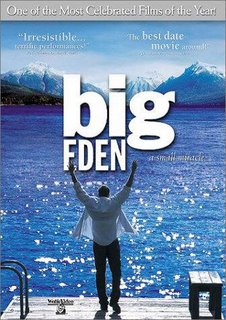
Big Eden
(2000)
Directed & Writing credits by
Thomas Bezucha
Cast overview
Arye Gross ....Henry Hart
Eric Schweig ....Pike Dexter
Tim DeKay....Dean Stewart
Louise Fletcher ....Grace Cornwell
George Coe ....Sam Hart
Nan Martin ....Widow Thayer
O'Neal Compton ...Jim Soams
Corinne Bohrer....Anna Rudolph
BIG EDEN
An artist living in NYC returns home to Big Eden, a rural area of Montana, to care for his ailing grandfather. The artist gets reacquainted with people from his past, including an old high school friend. Romantic complications ensue.
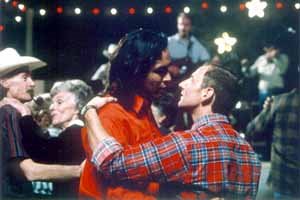 This is not a film for viewers looking for lots of fast paced action and excitement. It's more of a character study that focuses on the lives of warm-hearted, ordinary people who are caring and sensitive. People spend a lot of time cooking and eating. (I don't recall a film in which there was so much food). More idealistic than realistic, the film's underlying contemporary message is a welcome change from the usual Hollywood gloom and doom theme. On the other hand, some of the relationships between characters are not obvious, which renders a slightly muddled story.
This is not a film for viewers looking for lots of fast paced action and excitement. It's more of a character study that focuses on the lives of warm-hearted, ordinary people who are caring and sensitive. People spend a lot of time cooking and eating. (I don't recall a film in which there was so much food). More idealistic than realistic, the film's underlying contemporary message is a welcome change from the usual Hollywood gloom and doom theme. On the other hand, some of the relationships between characters are not obvious, which renders a slightly muddled story.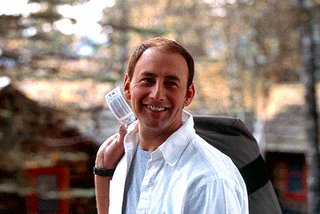
Overall, "Big Eden" is a well-made movie with good production design, adroit cinematography (that captures a beautiful landscape), and fine acting. And, I like the Tex-Mex music, though to someone like me who lives in Texas, the music seems a little out of place ... so to speak. But maybe not.
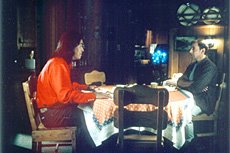
One of the best things about "Big Eden" is the inclusion of Nan Martin as an elderly gadabout. With her deep-throated voice and her animated expressions, she stands out as a unique, and thoroughly entertaining, actress. Would love to see her in more films.

I thought I was going to a free screening of Moulin Rouge, and got stuck watching Big Eden instead. I was a little apprehensive about sitting through a gay romantic comedy, but I had a free evening, so I thought, what the hell. And I wound up half-heartedly enjoying myself. Big Eden is the name of a small down in what seems to be the most beautiful (and most liberal-minded) corner of Montana.
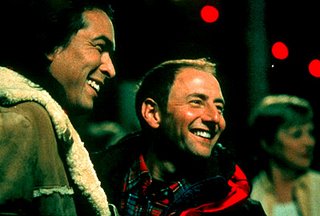 After 20 years away, Henry Hart (Arye Gross), a neurotic New York painter, is called back to his childhood home in order to take care of his ailing grandfather. Henry is torn up when macho Dean, the object of his teenage infatuations, also shows up in town and wants to pal around like old times. Meanwhile, Pike (Eric Schweig), a surly Native American who runs the local general store, finds himself attracted to Henry, but, unable to come to terms with his feelings (or, like Henry and Dean, his homosexuality), shows his affection for Henry by secretly cooking gourmet dishes that he is nominally delivering to the Hart household as offerings from the dodgy kitchen of the town spinster.
After 20 years away, Henry Hart (Arye Gross), a neurotic New York painter, is called back to his childhood home in order to take care of his ailing grandfather. Henry is torn up when macho Dean, the object of his teenage infatuations, also shows up in town and wants to pal around like old times. Meanwhile, Pike (Eric Schweig), a surly Native American who runs the local general store, finds himself attracted to Henry, but, unable to come to terms with his feelings (or, like Henry and Dean, his homosexuality), shows his affection for Henry by secretly cooking gourmet dishes that he is nominally delivering to the Hart household as offerings from the dodgy kitchen of the town spinster.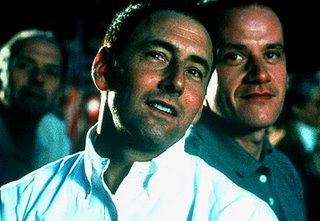
It's sweet, it's harmless, it's fluff. Writer/director Bezucha makes the standard indie mistake of populating his film with wonderful supporting characters (the film's joke is that everybody in this redneck cowboy town is completely aware - and supportive - of Henry and Pike's homosexuality, even while the two men desperately try to keep it hidden) while making his lead yet another dullard whom everybody apparently loves to death even though his personality registers as a big zero with the audience. Also, while you can't go wrong with that breathtaking Montana scenery, Rob Sweeney's cinematography is mostly by-the-books. Joseph Conlan contributes a decent score, though we really don't need to hear a "mystical Indian tune" whenever Pike appears onscreen. That said, if you can deal with a couple of scenes of men kissing each other (let's face it, the gay audience would have a fit of Bezucha kept his leading men's lips apart), you'll have a fine, if forgettable, time with this indie trifle. And Eric Schweig is quite impressive in a surprisingly complex role.
Arye Gross
 Stocky, unconventionally handsome supporting player and occasional lead of stage, TV and features. Gross got his start in West Coast stage productions ranging from classics ("The Three Sisters" and "Much Ado About Nothing") to contemporary works ("Room Service" and "Le Bete"). Gross made his feature debut in the "grade Z" actioner "Exterminator 2" (1984) and garnered some attention as C. Thomas Howell's roommate in the lackluster social satire "Soul Man" (1986). This turned out to be the defining role for Gross--the funny sidekick. Other features followed including "Tequila Sunrise" (1988), playing Mel Gibson's informant cousin, "Coup De Ville" (1990), as the middle brother and "A Midnight Clear" (1992), as the Jewish soldier.
Stocky, unconventionally handsome supporting player and occasional lead of stage, TV and features. Gross got his start in West Coast stage productions ranging from classics ("The Three Sisters" and "Much Ado About Nothing") to contemporary works ("Room Service" and "Le Bete"). Gross made his feature debut in the "grade Z" actioner "Exterminator 2" (1984) and garnered some attention as C. Thomas Howell's roommate in the lackluster social satire "Soul Man" (1986). This turned out to be the defining role for Gross--the funny sidekick. Other features followed including "Tequila Sunrise" (1988), playing Mel Gibson's informant cousin, "Coup De Ville" (1990), as the middle brother and "A Midnight Clear" (1992), as the Jewish soldier.While primarily a film and stage actor, Gross is best known for his work on the hit sitcom "Ellen" (ABC, 1994-95) entitled "These Friends of Mine" during its first season. As Adam, Ellen's platonic friend and roommate, Gross added a much needed male perspective to the mostly female forum.
Born: on 03/17/60 in Los Angeles, California
Actor

Education
• University of California at Irvine, Irvine, California, theater
Milestones
• 1984 Feature acting debut, "Exterminator 2"
• 1987 First film in a leading role, "House II: The Second Story"
• 1994 TV series debut as a regular role, "Ellen/These Friends of Mine"
• 2000 Had lead role of a NYC artist who returns to him hometown in Montana to care for his ailing grandfather in "Big Eden"
• Appeared in numerous West Coast stage productions including "The Three Sisters", "Taming of the Shrew" and "Much Ado About Nothing"
• Made TV guest appearances on the series "Different Strokes" and "Knight Rider"
• Performed in several radio plays for NPR (National Public Radio)
• Spent one year with the El Teatro Campesino
• Spent three years as a member of the South Coast Repertory Company
Eric Schweig
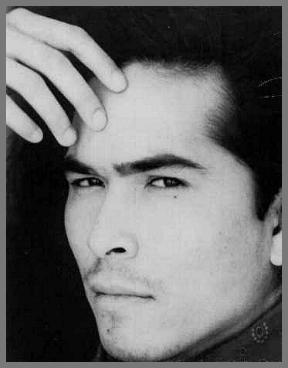 A prolific Canadian actor of German and Inuit decent, Eric Schweig has excelled onscreen since his feature debut in the 1990 drama The Shaman's Source. A notable key player in such subsequent features as The Last of the Mohicans, Squanto: A Warrior's Tale, and Ron Howard's The Missing, the stocky, physically imposing Schweig has built a lucrative career in Hollywood by both embracing his Inuit heritage and delivering performances that are thoughtful and moving. Schweig was adopted by a German family living in the Western Arctic shortly after his birth in the Canadian Northwest Territories in the summer of 1967, and though he would spend much of his youth living in Bermuda with his adopted family, the clan eventually returned to Canada to settle in Northern Ontario. Striking out on his own at the age of 16, the resourceful teen made a living by framing houses in his native Canada before a role in a 1987 Ontario stage production of The Cradle Will Fall sparked an interest in acting. In 1992, Schweig's career received just the boost it needed when he was hired by director Michael Mann to appear in The Last of the Mohicans, and the remainder of the 1990s found his onscreen career flourishing thanks to roles in such features as Squanto: A Warrior's Tale, The Scarlet Letter, and Tom and Huck. Schweig's 2000 portrayal of a quiet and unassuming general store owner who unexpectedly falls for a New York artist in the independent drama Big Eden offered what was perhaps his most emotionally complex role to date,
A prolific Canadian actor of German and Inuit decent, Eric Schweig has excelled onscreen since his feature debut in the 1990 drama The Shaman's Source. A notable key player in such subsequent features as The Last of the Mohicans, Squanto: A Warrior's Tale, and Ron Howard's The Missing, the stocky, physically imposing Schweig has built a lucrative career in Hollywood by both embracing his Inuit heritage and delivering performances that are thoughtful and moving. Schweig was adopted by a German family living in the Western Arctic shortly after his birth in the Canadian Northwest Territories in the summer of 1967, and though he would spend much of his youth living in Bermuda with his adopted family, the clan eventually returned to Canada to settle in Northern Ontario. Striking out on his own at the age of 16, the resourceful teen made a living by framing houses in his native Canada before a role in a 1987 Ontario stage production of The Cradle Will Fall sparked an interest in acting. In 1992, Schweig's career received just the boost it needed when he was hired by director Michael Mann to appear in The Last of the Mohicans, and the remainder of the 1990s found his onscreen career flourishing thanks to roles in such features as Squanto: A Warrior's Tale, The Scarlet Letter, and Tom and Huck. Schweig's 2000 portrayal of a quiet and unassuming general store owner who unexpectedly falls for a New York artist in the independent drama Big Eden offered what was perhaps his most emotionally complex role to date,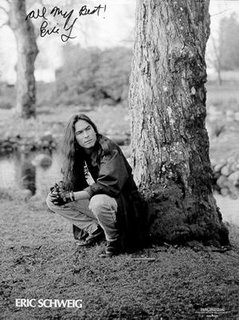 and the grateful actor earned almost unanimous critical praise for his memorable performance. Though Schweig's strong leading performance as a policeman attempting to save his brother from self-destruction in Skins also earned positive critical notice, the film unfortunately went largely unseen. Following a pair of supporting roles in 2003's Mrs. Barrington and Cowboys and Indians: The J.J. Harper Story, Schweig could next be seen as the menacing mystic whose powers border on the supernatural in acclaimed director Ron Howard's brutal Western The Missing. In addition to his acting career, Schweig has also gained a solid reputation as an artist thanks to his remarkable series of Inuit-inspired masks. ~ Jason Buchanan, All Movie Guide
and the grateful actor earned almost unanimous critical praise for his memorable performance. Though Schweig's strong leading performance as a policeman attempting to save his brother from self-destruction in Skins also earned positive critical notice, the film unfortunately went largely unseen. Following a pair of supporting roles in 2003's Mrs. Barrington and Cowboys and Indians: The J.J. Harper Story, Schweig could next be seen as the menacing mystic whose powers border on the supernatural in acclaimed director Ron Howard's brutal Western The Missing. In addition to his acting career, Schweig has also gained a solid reputation as an artist thanks to his remarkable series of Inuit-inspired masks. ~ Jason Buchanan, All Movie Guide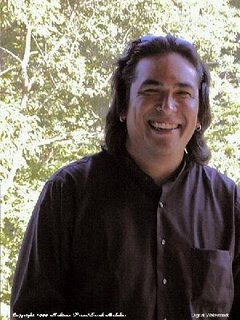
Schweig was born to an Inuit mother and a Chippewa Dene father in Inuvik, the Northwest Territories. At six months he was adopted by a German-Canadian family. During his childhood in Inuvik, Bermuda and Toronto he was systematically physically abused by his adoptive parents and ran away from home when he was 16, to become a laborer.
In 1987 he was "discovered" while walking down a Toronto street and cast in the movie The Shaman's Source. At least 16 other films have followed, most notably as Uncas in The Last of the Mohicans. During this period he endured a "roller coaster of alcohol, drugs, violence, failed relationships, despair and confusion" [Schweig] due to the abuse and racism and ethnic identity deprivation of his childhood.
In 1996 he began to regain his cultural identity and is now primarily a carver, especially of Inuit spirit masks, living on Vancouver Island, but he continues to act in films. He is a passionate opponent of the adoption of aboriginal of native people by Europeans.
Tim DeKay
 Big Eden Photos
Big Eden PhotosTim DeKay was born and raised in Lansing, New York. He graduated from Lansing High School in 1981 and is "quite close to 40." For college, DeKay received a B.S. in Business Administration from Le Moyne College and an M.F.A. in Acting from Rutgers University.

Tim DeKay has had a very varied television career. Last year, he booked the recurring role of Reverend Keyes on "Everwood" and appeared for two episodes. This year, he reprised his "Everwood" role in November and was cast as Clayton Jones on the HBO series "Carnivale." Before "Everwood," he appeared on "Party of Five," "Sports Night," and, "Friends."
DeKay has also had a varied career. He appeared in "Welcome to the Neighborhod," "Big Eden," "Swordfish," and "If These Walls Could Talk."
Tim also has had a very varied theater career. He is a lifetime member orf the Actors Studio and teachs acting workshops at LeMoyne College
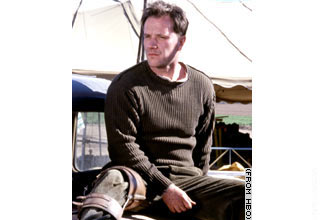

0 Comments:
Post a Comment
<< Home